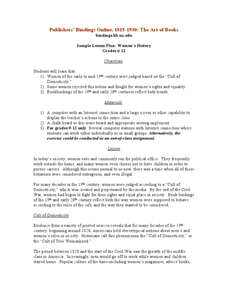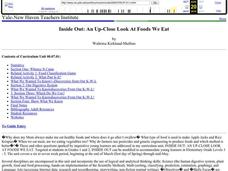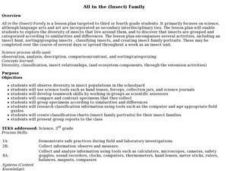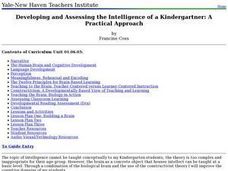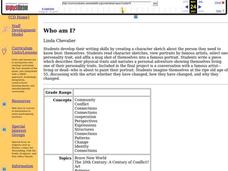Curated OER
Macbeth
Students discuss the changes the characters go through in Shakespeare's play Macbeth. They discuss the themes of the play write an essay comparing current events to the themes of the play.
Curated OER
ARTIFACT to ART to GLYPHS
Students study the development of early Latin American civilizations in unit one. The second part of the unit is based on early image-making attempts from the Cro-Magnon to the Peruvian Incas. Students create their own weavings using a...
Curated OER
Creepy Crawlies
Second graders study the world of insects. They join Greenpatch Kids, an organization of young people who are interested in nature and want to protect our environment. In addition, the students assess use of technology as a valuable...
Curated OER
Families of Instruments
Students identify families of instruments. In this music lesson, students read Berlioz the Bear and identify the families of instruments. Students sing "Mr. Gus Goes Goofy," and listen for the sounds of the instruments.
Curated OER
Women's History
Students research famous women in history. In this Women's History month instructional activity, students choose one historical woman to research and use biographies and websites to gather information. Students complete an included...
Curated OER
ESL: Passive Voice Activity
In this ESL passive voice worksheet, students put sentences into passive voice with 50 total. A link to audio and additional resources is given.
Curated OER
Exploring Special Lines
Learners compare and order numbers. In this geometry lesson, students write equations for inequalities. They differentiate and apply concepts of triangular properties to solve problems.
Curated OER
Inside Out: An Up-Close Look At Foods We Eat
Fourth graders identify the origins of meats and vegetables consumed by humans on a daily basis. They classify foods (meats, dairy products, grains...) and create a food pyramid.
Curated OER
Origami
Students, through active participation in Japanese origami, demonstrate their skills in this cultural art form and develop an appreciation for other cultures.
Curated OER
"Here Comes the Train"
Students read and explore the story, The Little Engine that Could, by Watter Piper.
Curated OER
Microbes 1: What's Bugging You?
Learners build on existing knowledge of microbes, focusing on the relationship between microorganisms and foodborne illness, as well as the implications that foodborne illness has on human health.
Curated OER
Using Sterile Techniques as a Tool in Studying Plant Diseases
Seventh graders examine the concept of sterile techniques. They realize that plant diseases can be identified and classified in various way. Students identify some of the diseases that attack the garden plants.
Curated OER
Money Pit
Sixth graders make a list of aspects of our culture found on a penny, and then observe another object based on another culture. In this culture lesson plan, 6th graders take their new object and research that culture.
Curated OER
Flour Beetles
Learners observe life stages in flour beetles and graph the results. They write a summary report.
Curated OER
Beneficial Bug Scavenger Hunt
Students identify several beneficial insects and spiders, including predators and pollinators. They search an outdoor environment and record numbers and types of beneficial insects and spiders that they discover.
Curated OER
Gyotaku Lesson Plan
Young scholars examine and discuss the history and process of Gyotaku, or fish prints. They view images of Gyotaku, create a fish print, and write a haiku.
Curated OER
Where Have All the Glaciers Gone?
Fourth graders discover that scientists examine evidence from around the world in order to explain global climate change. They see that records of climate change exist, and describe photographs interpreting changes in glaciers over time.
Curated OER
All in the (Insect) Family
Students participate in a series of activities in order to explore the diversity of insects. They explore how insects are grouped and categorized.
Curated OER
Developing and Assessing the Intelligence of a Kindergartner: A Practical Approach
Students name objects that are the same size, shape, and weight as the human brain. They touch the model brain, feeling the folds, etc. They make connections to the chart displaying the brain-like objects. They touch the 'potato flake'...
Curated OER
Animal Trackers
Students use space technology to monitor migratory species, map their movements, and gather data about their habitats and possible responses to climatic shifts.
Curated OER
Commutative Property
First graders investigate the Commutative Property of Addition. It is introduced using models such as students, counters, balances and dominoes. They discover the order of the numbers in an addition sentence does not change the result...
Curated OER
Ruler and Magnifying Fun
First graders investigate objects using rulers and magnifying glasses. They record their observations using a data-recording sheet and write a characteristic for each item they observe. They use the ruler to solve math problems.
Curated OER
Who am I?
Young scholars practice their writing skills by creating a character sketch of themselves. After viewing portraits, they select one personality trait and put their own picture into the painting of their choice. They include a...
Curated OER
Who am I?
Students develop their writing skills by creating a character sketch about themselves. Students read character sketches, view portraits by famous artists, select one personality traits, and affix a mug shot of themselves into a famous...
Other popular searches
- Age of Discovery Map
- Age of Discovery Projects
- Explorers Age of Discovery
- First Age of Discovery
- The Age of Discovery
- History Age of Discovery
- Navigation Age of Discovery
- Age of Discovery Worksheets
- Russia Age of Discovery
- Astronomy Age of Discovery






